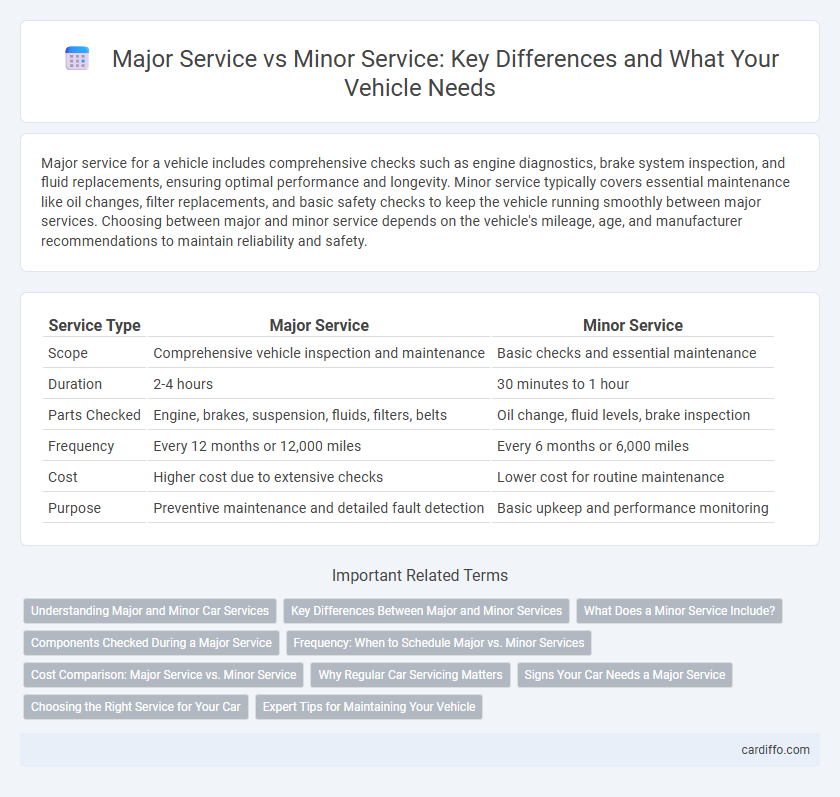Major service for a vehicle includes comprehensive checks such as engine diagnostics, brake system inspection, and fluid replacements, ensuring optimal performance and longevity. Minor service typically covers essential maintenance like oil changes, filter replacements, and basic safety checks to keep the vehicle running smoothly between major services. Choosing between major and minor service depends on the vehicle's mileage, age, and manufacturer recommendations to maintain reliability and safety.
Table of Comparison
| Service Type | Major Service | Minor Service |
|---|---|---|
| Scope | Comprehensive vehicle inspection and maintenance | Basic checks and essential maintenance |
| Duration | 2-4 hours | 30 minutes to 1 hour |
| Parts Checked | Engine, brakes, suspension, fluids, filters, belts | Oil change, fluid levels, brake inspection |
| Frequency | Every 12 months or 12,000 miles | Every 6 months or 6,000 miles |
| Cost | Higher cost due to extensive checks | Lower cost for routine maintenance |
| Purpose | Preventive maintenance and detailed fault detection | Basic upkeep and performance monitoring |
Understanding Major and Minor Car Services
Major service involves comprehensive checks and replacements such as oil change, brake inspection, spark plug replacement, and fluid top-ups, typically required every 30,000 to 60,000 miles. Minor service focuses on basic maintenance tasks including oil and filter changes, tire pressure checks, and fluid level assessments, usually occurring every 5,000 to 10,000 miles. Understanding the difference between major and minor car services helps maintain optimal vehicle performance and prevents costly repairs.
Key Differences Between Major and Minor Services
Major service involves comprehensive checks including engine oil replacement, brake inspection, and transmission fluid change, typically performed after a longer interval or higher mileage. Minor service focuses on essential maintenance like oil and filter changes, fluid top-ups, and basic system checks carried out more frequently. Key differences lie in the scope, cost, and frequency, with major services addressing deeper mechanical components and minor services targeting routine upkeep.
What Does a Minor Service Include?
A minor service typically includes an oil and filter change, inspection of key components such as brakes, tires, and fluid levels, and basic safety checks like lights and wipers. This service often involves topping up essential fluids including coolant, brake fluid, and windshield washer fluid. Minor services focus on maintenance tasks that ensure vehicle reliability and prevent major issues but do not usually cover in-depth mechanical repairs or complex diagnostics.
Components Checked During a Major Service
Major service inspections extensively evaluate critical components such as the engine, transmission, brakes, suspension, and exhaust system, ensuring optimal vehicle performance and safety. Fluids including engine oil, brake fluid, coolant, and transmission fluid are thoroughly checked and replaced if necessary, maintaining operational efficiency. Comprehensive diagnostics on electrical systems, filters, belts, and tires are also conducted to detect wear and potential issues that minor service typically does not cover.
Frequency: When to Schedule Major vs. Minor Services
Major services are typically scheduled every 30,000 to 50,000 miles, depending on the vehicle manufacturer's recommendations, while minor services often occur every 5,000 to 10,000 miles. Minor services focus on routine tasks like oil changes and fluid top-ups, whereas major services include comprehensive inspections and replacements such as brake pads and timing belts. Adhering to the correct frequency for each service type ensures optimal vehicle performance and longevity.
Cost Comparison: Major Service vs. Minor Service
Major service typically costs significantly more than minor service due to comprehensive inspections, replacement of multiple parts, and extensive labor hours. Minor service focuses on essential maintenance tasks like oil changes and filter replacements, resulting in lower costs and shorter service times. Pricing varies by vehicle make and model but major service expenses can be two to three times higher than minor service charges.
Why Regular Car Servicing Matters
Regular car servicing enhances vehicle safety, improves fuel efficiency, and prevents costly repairs by addressing potential issues early. Major services involve comprehensive checks and replacements, such as timing belts and brake fluids, while minor services focus on essential maintenance like oil changes and filter replacements. Consistent servicing ensures optimal engine performance and extends the lifespan of your vehicle.
Signs Your Car Needs a Major Service
Signs your car needs a major service include persistent engine warning lights, unusual noises from the engine or brakes, and noticeable drops in fuel efficiency. Difficulty starting the vehicle, rough idling, and decreased performance also indicate urgent attention is required. Ignoring these symptoms can lead to costly repairs and compromised safety.
Choosing the Right Service for Your Car
Selecting the appropriate service for your vehicle involves evaluating the manufacturer's recommended maintenance schedule, which outlines the intervals for major and minor services. Minor services typically include essential checks like oil changes, fluid top-ups, and basic inspections, ensuring ongoing engine health and performance. Major services encompass comprehensive diagnostics, replacement of critical components, and in-depth system overhauls, safeguarding the vehicle's longevity and preventing costly repairs.
Expert Tips for Maintaining Your Vehicle
Regularly scheduling Major Service ensures comprehensive vehicle inspections, including engine diagnostics, brake system checks, and fluid replacements to prevent costly repairs. Minor Service focuses on essential maintenance tasks such as oil changes, filter replacements, and tire pressure monitoring to maintain optimal performance. Expert tips recommend adhering to manufacturer service intervals and using certified technicians to enhance vehicle longevity and safety.
Major Service vs Minor Service Infographic

 cardiffo.com
cardiffo.com